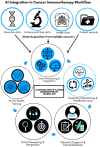Integrating AI into Cancer Immunotherapy-A Narrative Review of Current Applications and Future Directions
- PMID: 39851488
- PMCID: PMC11764268
- DOI: 10.3390/diseases13010024
Integrating AI into Cancer Immunotherapy-A Narrative Review of Current Applications and Future Directions
Abstract
Background: Cancer remains a leading cause of morbidity and mortality worldwide. Traditional treatments like chemotherapy and radiation often result in significant side effects and varied patient outcomes. Immunotherapy has emerged as a promising alternative, harnessing the immune system to target cancer cells. However, the complexity of immune responses and tumor heterogeneity challenges its effectiveness.
Objective: This mini-narrative review explores the role of artificial intelligence [AI] in enhancing the efficacy of cancer immunotherapy, predicting patient responses, and discovering novel therapeutic targets.
Methods: A comprehensive review of the literature was conducted, focusing on studies published between 2010 and 2024 that examined the application of AI in cancer immunotherapy. Databases such as PubMed, Google Scholar, and Web of Science were utilized, and articles were selected based on relevance to the topic.
Results: AI has significantly contributed to identifying biomarkers that predict immunotherapy efficacy by analyzing genomic, transcriptomic, and proteomic data. It also optimizes combination therapies by predicting the most effective treatment protocols. AI-driven predictive models help assess patient response to immunotherapy, guiding clinical decision-making and minimizing side effects. Additionally, AI facilitates the discovery of novel therapeutic targets, such as neoantigens, enabling the development of personalized immunotherapies.
Conclusions: AI holds immense potential in transforming cancer immunotherapy. However, challenges related to data privacy, algorithm transparency, and clinical integration must be addressed. Overcoming these hurdles will likely make AI a central component of future cancer immunotherapy, offering more personalized and effective treatments.
Keywords: artificial intelligence; biomarkers; cancer immunotherapy; personalized medicine; predictive models.
Conflict of interest statement
The authors declare no conflicts of interest.
Figures





Similar articles
-
Personalized cancer vaccine design using AI-powered technologies.Front Immunol. 2024 Nov 8;15:1357217. doi: 10.3389/fimmu.2024.1357217. eCollection 2024. Front Immunol. 2024. PMID: 39582860 Free PMC article. Review.
-
Revolutionizing breast cancer immunotherapy by integrating AI and nanotechnology approaches: review of current applications and future directions.Bioelectron Med. 2025 May 30;11(1):13. doi: 10.1186/s42234-025-00173-w. Bioelectron Med. 2025. PMID: 40442841 Free PMC article. Review.
-
Artificial intelligence (AI) in restorative dentistry: current trends and future prospects.BMC Oral Health. 2025 Apr 18;25(1):592. doi: 10.1186/s12903-025-05989-1. BMC Oral Health. 2025. PMID: 40251567 Free PMC article. Review.
-
AI-Guided Cancer Therapy for Patients with Coexisting Migraines.Cancers (Basel). 2024 Oct 31;16(21):3690. doi: 10.3390/cancers16213690. Cancers (Basel). 2024. PMID: 39518129 Free PMC article. Review.
-
Artificial Intelligence and Advanced Technology in Glaucoma: A Review.J Pers Med. 2024 Oct 16;14(10):1062. doi: 10.3390/jpm14101062. J Pers Med. 2024. PMID: 39452568 Free PMC article. Review.
Cited by
-
Reversing Epigenetic Dysregulation in Neurodegenerative Diseases: Mechanistic and Therapeutic Considerations.Int J Mol Sci. 2025 May 21;26(10):4929. doi: 10.3390/ijms26104929. Int J Mol Sci. 2025. PMID: 40430067 Free PMC article. Review.
References
-
- Amjad M.T., Chidharla A., Kasi A. StatPearls [Internet] StatPearls Publishing; Treasure Island, FL, USA: 2024. Cancer Chemotherapy.
Publication types
LinkOut - more resources
Full Text Sources

